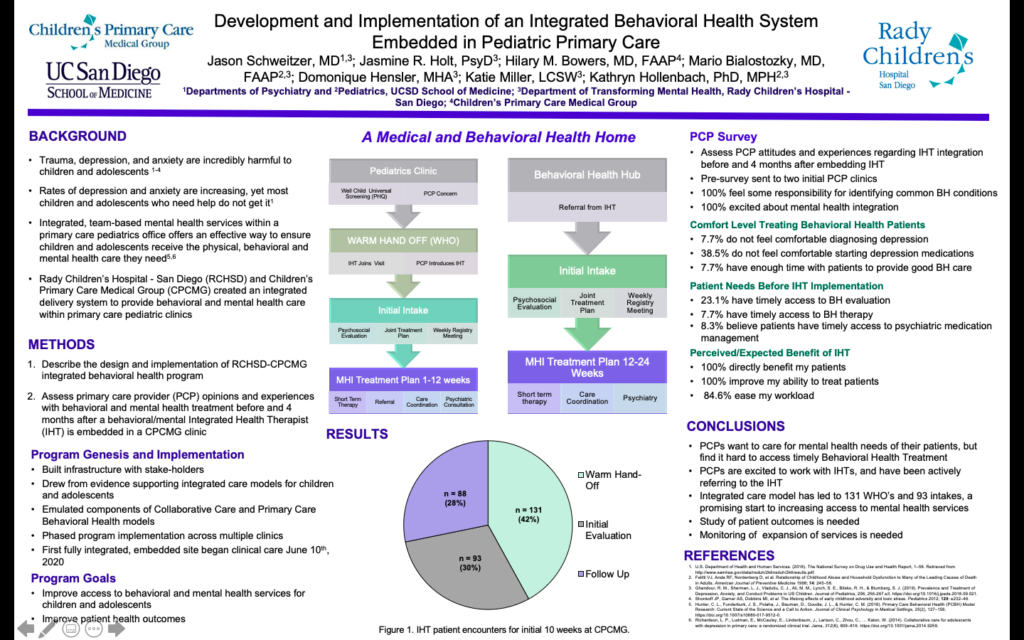Rady Children’s Hospital-San Diego has released promising results from a pilot program that embeds mental health clinicians in pediatric primary care practices.
Preliminary results of the program, published in the November 2023 issue of Frontiers in Psychiatry, indicate that patient response to therapy has resulted in a 62 percent decrease in depression symptoms and a 44 percent reduction in anxiety symptoms.
The pediatric mental health crisis continues to grow at an exponential rate. Rady Children’s pointed out that the American Academy of Pediatrics has declared the mental health crisis among children and teens a national emergency. A recent study from the Journal of the American Medical Association found that emergency department visits among children, adolescents and young adults for mental health reasons approximately doubled, from 4.8 million to 7.5 million from 2011 to 2020. The emergency has been further heightened by the COVID-19 pandemic.
“The difficult truth is that children and adolescents often do not receive mental health care when they need it,” said Domonique Hensler, M.H.A., senior director of systemwide care at Rady Children’s, in a statement. A co-author of the study, Hensler added that “the need for effective, accessible treatment is more pressing than ever. Our interdisciplinary, team-based approach to pediatric mental healthcare has been shown to be efficacious, accessible, and cost-effective.”
Under the Rady Children’s Transforming Mental Health model, established in 2020, primary care providers screen children and adolescents for potential mental health issues during regular visits, such as annual wellness checks. Children and teens identified as struggling with depression or anxiety or in the beginning stages of a mental health concern can speak to a mental health professional in the same office often on the same day. A more typical healthcare experience leaves it up to families to navigate through a list of unfamiliar mental health resources to arrange care on their own, often with wait times exceeding several months.
“With the integrated care model, the pediatrician can literally walk down the hall and introduce the family to the therapist right there in the office,” said Benjamin Maxwell, M.D., division chief of Child & Adolescent Psychiatry and The Una Davis Family Chair in Behavioral Health at Rady Children’s and associate clinical professor of psychiatry at UC San Diego School of Medicine, in a statement. “Families are already coming to a place that they trust, which enhances continuity of care and ultimately better outcomes.”
Eleven primary care sites and four regional support hubs in the San Diego and Riverside regions participate in the program, which emphasizes early detection, early intervention and early recovery for mild to moderate cases using a family-centered and population health-based approach. Routine depression screenings begin at age 12 while other individualized evaluation methods are utilized for younger ages.
Primary care providers receive training on the integrated care model and are offered a three-day, in-depth training on the assessment and treatment of common mental health conditions with six monthly follow-ups. So far, more than 200 providers have completed a fellowship on the program, with an estimated 100 referrals made every week.
“Beginning upstream, before mental health issues in children and adolescents become severe is crucial to solving the mental health crisis,” said Adam Breslow, M.D., M.B.A., president & CEO of Children’s Primary Care Medical Group (CPCMG), in a statement. CPCMG is San Diego’s largest medical group specializing in health care for kids from birth to age 19. “In our collaborative model, families are introduced to a mental health professional by someone they know and trust. The process is well accepted by patients and families. As we are their medical home, the ease of access is unparalleled,” Breslow added.
The Primary Care Mental Health Integration program is part of a larger Transforming Mental Health Initiative at Rady Children’s that spans all of the health system’s behavioral health services, including a behavioral health urgent care and the Copley Psychiatric Emergency Department, both serving the unique needs of patients requiring immediate and long-term care for mental and behavioral health challenges.
“By integrating mental and behavioral health services in pediatric primary care settings, we’re helping to break through the biggest barrier to treatment – access to care,” said Patrick Frias, M.D., president & CEO of Rady Children’s, in a statement. “We’re incredibly encouraged by the results of the program and believe this model has the potential to become the standard of care nationwide.”







